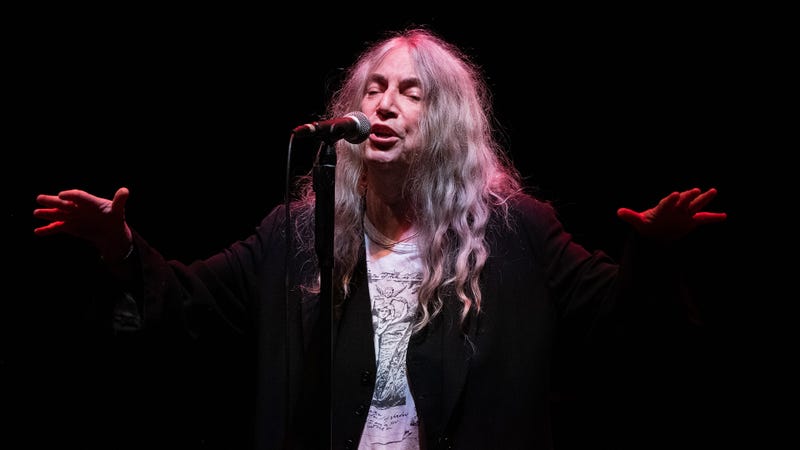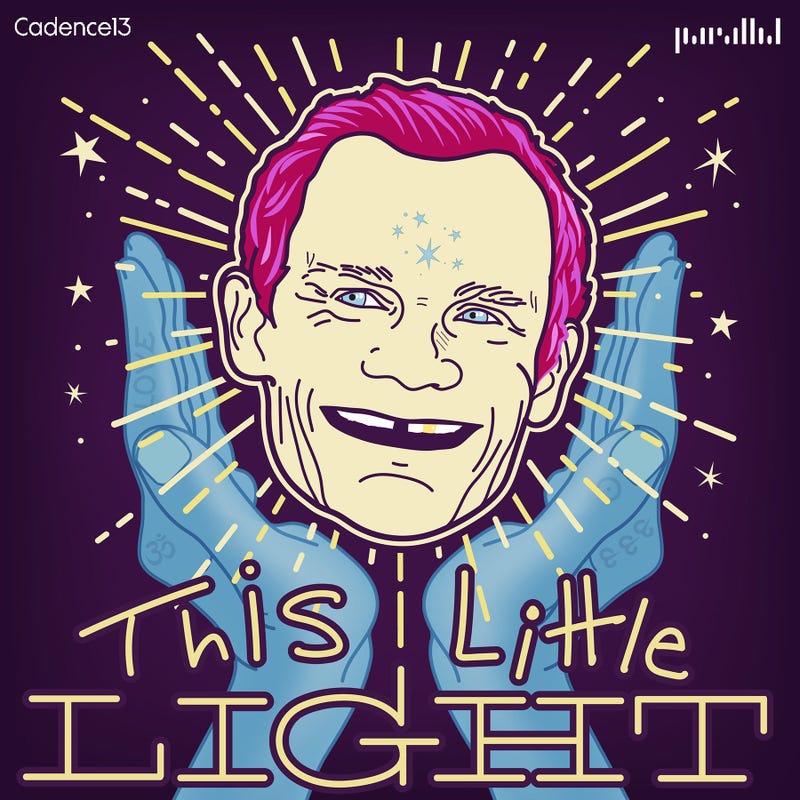
Red Hot Chili Peppers bassist Flea sits down with singer, songwriter, poet, painter, author, and NYC Punk icon Patti Smith this week on the third episode of his new 15-part podcast series, This Little Light.
LISTEN NOW: This Little Light from Cadence13: Patti Smith
Following his previous discussions with FINNEAS and Rick Rubin, Red Hot Chili Peppers bassist Flea dives into Patti Smith’s musical education and evolution after she says she was first transfixed by the sounds of Little Richard’s "Tutti Frutti" while walking down the street with her mom. After hearing opera singer Eleanor Steber’s Madama Butterfly piece, “Un Bel Di” on the radio, she explains that was the route in music that she thought she would take. Eventually, Smith got her start in the poetry scene at the advice of Ohio-born folk singer and songwriter Bobby Neuwirth, and eventually began writing songs for Blue Oyster Cult.
Now known as the "punk poet laureate," Patti began to embrace the scene at New York City's seedy Chelsea Hotel -- which over the years hosted in its hotel/commune halls artists like Jackson Pollock, Dylan Thomas, Arthur Miller, Bob Dylan, Robert Mapplethorpe, the Sex Pistols' Sid Vicious, Rufus Wainwright, Betsey Johnson, and Andy Warhol among countless others -- including late singer Janis Joplin.
"There was no celebrity cult, or rockstars," Patti says of those Chelsea days. "I lived there, [Janis] was coming into my house," Patti says of her friendship with Joplin. "The only difference between us," she adds, "we all dressed the same and all, was her room was bigger. She had like, a kitchen; I had, like, a room. No Bathroom. She had a bathroom. I could go in and use her bathroom. It was different. They'd walk down the street, people weren't taking people's pictures or asking for autographs or nothing."
There was more of a teamwork kind of vibe, because as Patti says, "ideologically, people were really into the same type of thing. We were part of the civil rights movement, the anti-war movement, developing music globally in some language that equated with 'peace and love,' however corny that sounds to people now. At that time, it was a mission."
"We were talking earlier about meeting people," Patti adds. "it was just the 51st anniversary of [New York City's] Electric Lady Studios, and I was there. I was like 22-23 years old when Jimi Hendrix opened that studio... I wrote record reviews to make a little extra money, and I was invited to the opening. He had so many hopes and dreams for this, not only being a place to make music but to educate and spread a positive ideology through music. I was at this party, I was so shy, and I was sitting on the steps and I remember I was trying to dress like 'East Of Eden.' I had this long polka dot dress and a straw hat trying to make an impression but I didn't have the nerve to go in."
When Jimi left early, he ran into Patti on the outside steps, said hello, and asked if she was going into the party. "He told me that he was also shy," Patti says, "and then he started telling me about the studio. He told me he wanted to stop touring, travel the world, and get musicians from all over the world, with all their different instruments, and take them all to Woodstock and sit in a field for a month... playing and playing until they churned like butter, and they found with all the different keys and strange instruments and different cultures, one language. He said, 'You know what that language is? The universal language of peace, ya dig?' And then he left and I was like, 'Whoa!'"
"He really felt they could take that music and then open up the world," Patti adds. "Go anywhere in the world, find one universal tone or one universal conversation or grammar that could include everyone. I never dreamed at that point, that was 1970 I think, that five years later I'd be recording 'Horses.' That was in August, he died in September. It was heartbreaking. He had everything that you would want -- not only did he have such a beautiful look and was so powerful as a performer -- but he had hopes for the future. He was a visionary... even though he was a couple of years older than me, I could see his vision, it had a huge scope. That's the kind of things we believed in then, and it was all love-based."
Listen to the full conversation above, as Flea and Patti discuss raising her kids with her husband Fred in Michigan, away from the pressures of the music industry; receiving important advice from William S. Burroughs, and Patti remembers a class with her eighth-grade music teacher that’s stayed with her throughout her career. Patti Smith is the author of the National Book Award winner, Just Kids, as well as Woolgathering, M Train, Year of the Monkey, and Devotion. Her seminal album Horses has been hailed as one of the top 100 albums of all time. Inducted into the Rock & Roll Hall of Fame in 2007, Smith is also the recipient of the ASCAP Founders Award, Sweden’s Polar Prize for significant achievements in music, and the 2020 PEN Literary Service Award, among other accomplishments.
Hosted by Flea, founding member and bassist of the Red Hot Chili Peppers, This Little Light is a podcast about falling in love with music. Flea interviews musical guests from all genres to discuss the teachers who guided them, the influences that inspired them, and how the lessons they learned as young musicians have shaped their creativity, resilience, and careers. The podcast is produced by Cadence13 and Parallel, with proceeds benefiting the Silverlake Conservatory of Music, a Los Angeles-based non-profit that Flea co-founded in 2001.
LISTEN on the Audacy App
Sign Up and Follow Audacy
Facebook | Twitter | Instagram

